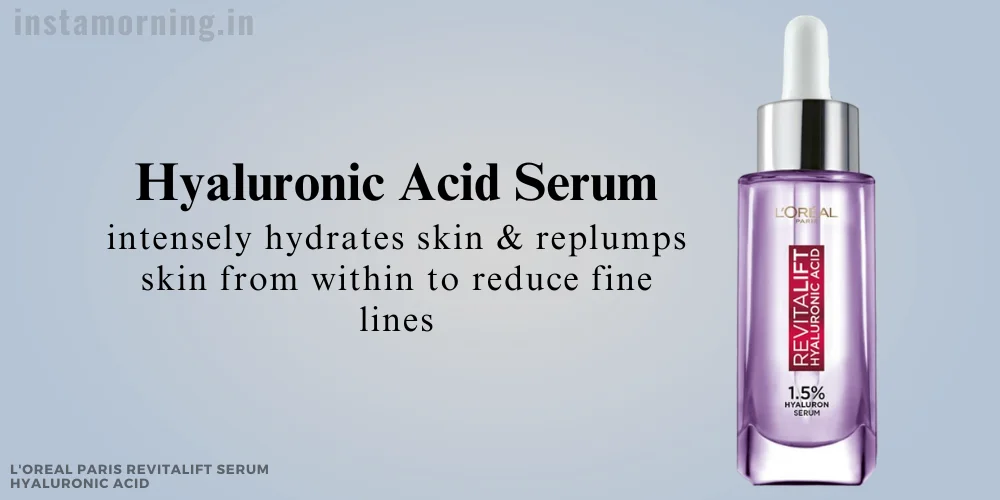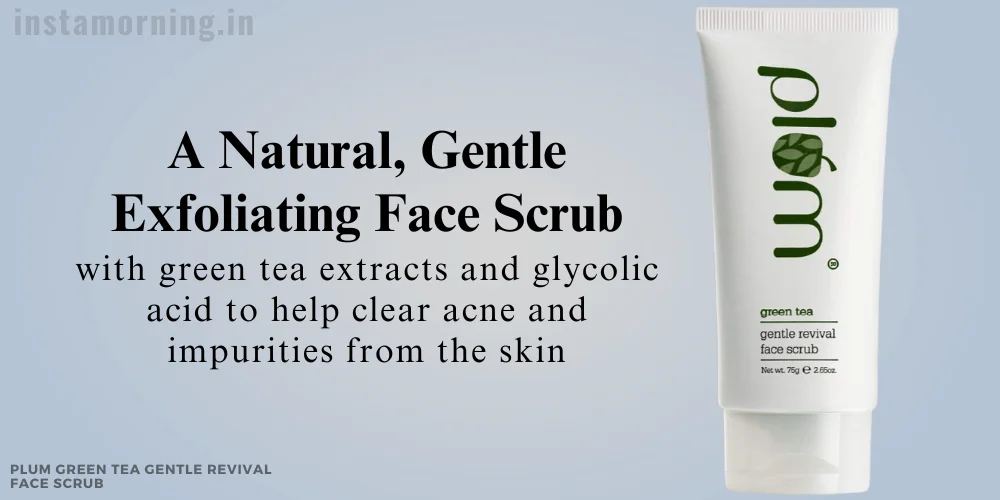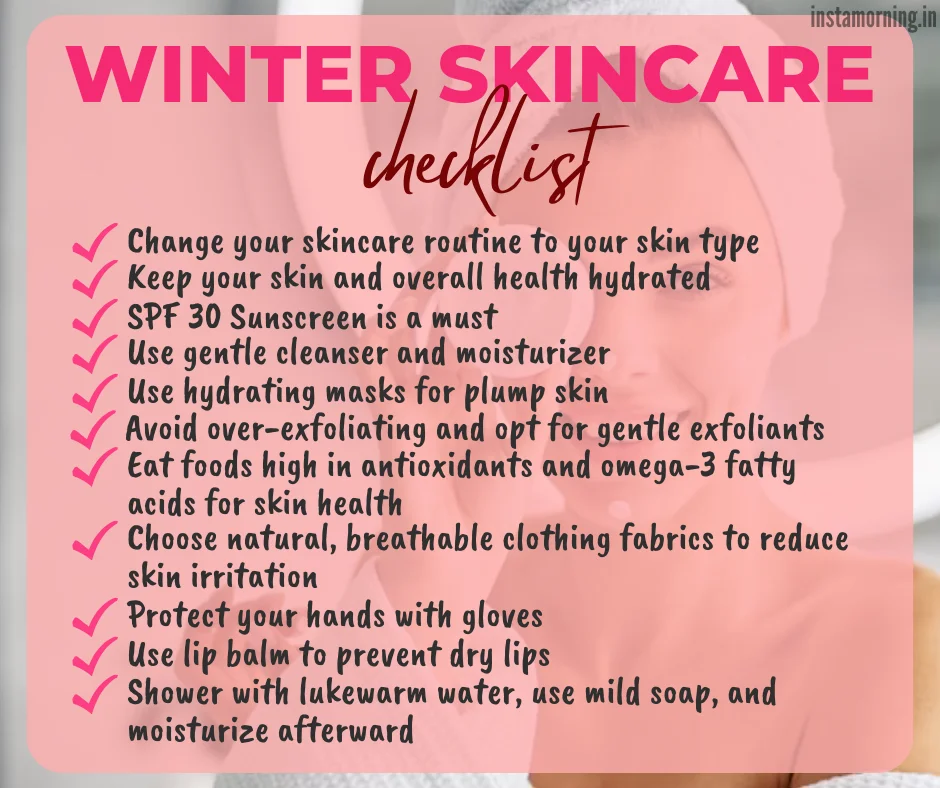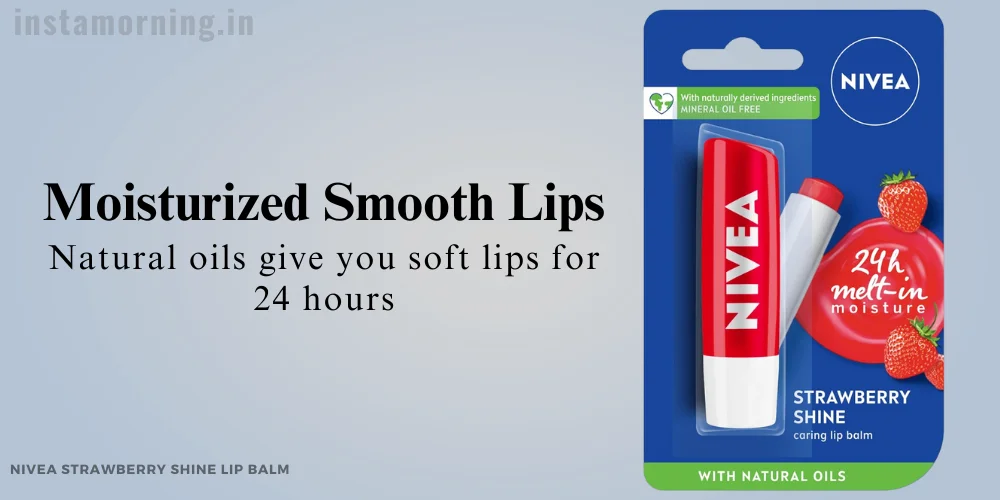Winter is all about cozy scarves and hot cocoa, but it’s also the perfect time to revamp your skincare routine for a healthy, vibrant complexion.
How Winter Affects Your Skin
Winter can have a significant impact on your skin, but knowing how to take care of your skin in winter can make all the difference.
The decreased moisture in the air and the use of heaters can lead to increased water evaporation from the skin, resulting in dry skin that is more prone to rashes.
Acne in winter is a common skin concern intensified by the season’s cold, dry conditions, which often lead to increased sebum production and the clogging of pores, resulting in breakouts.

Cold weather can worsen or cause several skin conditions, including eczema, Raynaud’s phenomenon, cold-induced hives (urticaria), chilblains, and others.
As a response to dry and cold conditions, our skin undergoes molecular changes. The top layer of the skin, known as the stratum corneum, thickens to prevent water loss. In extreme cold, blood vessels in the skin can constrict, reducing the oxygenation of the skin.
Identify Your Skin Type
The classification of skin types depends on their behaviour and characteristics. Identify your skin type from the following five skin types:
Normal Skin
Normal skin is well-balanced, neither too oily nor too dry. It has balanced sebum production and good blood circulation. People with normal skin tend to have a smooth texture, fine pores, no sensitivity, few or no blemishes, and a radiant complexion.
Oily Skin
Oily skin is characterized by excessive sebum production, resulting in a greasy appearance. It is more prone to acne breakouts and blackheads.
Dry Skin
Dry skin is identified by its flaky and rough texture. It can feel tight and may cause irritation. This type of skin produces less oil and is vulnerable to weather changes.
Combination Skin
Combination skin is a mixture of both oily and dry skin. In this type, the T-zone (forehead, nose, and chin) is often oily, while the cheeks may be dry.
Sensitive Skin
Sensitive skin is easily irritated and reactive. It can exhibit redness, itching, and discomfort and may flush easily, especially after exposure to certain triggers like spicy food or harsh skincare products.
Adapting Winter Skincare Routine For Your Skin Type
Winter skincare varies depending on your skin type, and it’s essential to tailor your routine to address specific concerns. Here’s a suggested winter skin care routine for different skin types:
Normal Skin
Cleansing: Use a gentle, hydrating cleanser to clean your skin without stripping its natural oils.
Moisturizing: Opt for a lightweight, non-comedogenic moisturiser to maintain hydration without making your skin feel greasy.
Sunscreen: Even in winter, don’t skip sunscreen to protect your skin from UV rays.
Oily Skin
Cleansing: Choose a gentle, foaming cleanser to remove excess oil and impurities without over-drying.
Exfoliation: Exfoliate 2-3 times a week to prevent clogged pores. Use products with salicylic acid.
Moisturizing: Use an oil-free, gel-based moisturizer to maintain moisture balance.
Sunscreen: A lightweight, mattifying sunscreen is ideal for oily skin.
Dry Skin
Cleansing: Use a mild, creamy cleanser that doesn’t strip your skin of its natural oils.
Exfoliation: Limit exfoliation to once a week to avoid further drying out the skin.
Hydration: Opt for a rich, hydrating moisturizer to combat dryness. Consider a moisturizer with added ceramides.
Sunscreen: Use a moisturizer with SPF or layer sunscreen over your moisturizer for added protection.
Combination Skin
Cleansing: Use a gentle cleanser suitable for all skin types. Pay extra attention to areas that tend to be oily or dry.
Moisturizing: Apply a lightweight, non-comedogenic moisturizer. Use a heavier moisturizer on dry areas.
Exfoliation: Exfoliate 1-2 times a week, focusing on areas with dry or flaky skin.
Sunscreen: Choose a broad-spectrum sunscreen for daily protection.
Sensitive Skin
Cleansing: Opt for a fragrance-free, hypoallergenic cleanser to minimize irritation.
Moisturizing: Use a gentle, soothing moisturizer formulated for sensitive skin.
Exfoliation: Skip physical exfoliation and choose a chemical exfoliator specifically designed for sensitive skin.
Sunscreen: Use a mineral-based sunscreen with zinc oxide or titanium dioxide to reduce the risk of irritation.
Remember to drink plenty of water, maintain a healthy diet, and avoid hot showers, as they can further dry out your skin in winter.
Tailoring your skin care routine to your specific skin type will help you combat the challenges of the colder months and keep your skin healthy and radiant.
Winter Skincare Tips
Prepare your skin and hair for winter with these 14 essential tips to maintain their health and beauty during the colder months.
Hydration is Key
Proper hydration begins from within. Drinking an adequate amount of water each day helps maintain skin moisture and overall health.
So, how much water should you drink a day?
The recommended daily water intake can vary depending on factors such as age, sex, activity level, and climate. However, a commonly cited guideline suggests consuming eight 250ml glasses of water per day, approximately equivalent to about 2 litres or half a gallon.

Hydration is a fundamental element of skin health. Adequate hydration is essential for maintaining healthy, glowing skin. Here’s some information on the connection between hydration and skin health:
Moisture Retention: Proper hydration helps your skin retain moisture, preventing it from becoming dry, flaky, or itchy. Dry skin is more prone to irritation and fine lines.
Elasticity: Well-hydrated skin is more elastic and less prone to developing wrinkles and sagging. It maintains a youthful appearance, thanks to the water content in the skin’s cells.
Barrier Function: The skin acts as a barrier to protect your body from external factors. When well-hydrated, this barrier function is optimized, helping shield the skin from irritants and pollutants.
Even Skin Tone: Hydrated skin is less likely to develop redness or uneven skin tone. It can help minimize the appearance of redness, blemishes, and blotchiness.
Preventing Premature Aging: Proper hydration can delay the signs of ageing, such as fine lines and wrinkles. It’s a natural and cost-effective way to maintain youthful-looking skin.
Adjust Your Skincare Routine
Simplify your skincare routine by using a gentle cleanser, winter moisturizer, and sunscreen, especially if your skin is sensitive due to the dry winter air.
Skincare Masks
Skin care masks designed for skin hydration are a popular addition to many people’s beauty routines. These masks are formulated to provide intense moisture to the skin, leaving it plump, smooth, and glowing.
Sunscreen is a Must
Sun protection is important during the winter months, just as it is in the summer because the sun’s harmful UV rays are still present.
Using sunscreen in the winter is essential. Opt for a broad-spectrum sunscreen with at least SPF 30. Apply it to exposed areas, including your face, neck, and hands.
This helps protect your skin from UVB and UVA rays, which can cause sunburn, premature ageing, and increase the risk of skin cancer.
Use Overnight Treatments
Emollients, which are heavier creams, are specifically designed to provide intensive moisture and hydration to your skin during the nighttime hours when your skin has the opportunity to repair itself.
Some emollients and products that work well for overnight use during the winter are Hyaluronic Acid Serum, Petroleum Jelly, Shea Butter, Coconut Oil and Olive Oil.

Use a Humidifier
Humidifiers can add moisture to the air, which can prevent and relieve skin dryness, especially when indoor heating is on.
Dial Down the Temperature
Opt for lukewarm water instead of hot water when taking showers or baths to prevent stripping your skin’s natural oils.
Go Easy on Exfoliants and Scrubs
Avoid over-exfoliating, and if you use exfoliants, consider using gentle chemical exfoliants rather than harsh physical scrubs.

Nutrition for Skin
Stay well-hydrated and consume foods high in antioxidants and omega-3 fatty acids for overall skin health.
Opt for Non-Irritating Fabrics
Wear comfortable, natural fabrics to reduce the risk of skin irritation, especially if your skin is very dry.
Wear Gloves
Use warm gloves when going out in the cold and silicone gloves when washing dishes to protect your hands from dryness.
Lip Care in Winter
Don’t forget to care for your lips by using lip balms or chapsticks with hydrating ingredients to prevent dry and chapped lips in winter.
Hair Care in Winter
Protect your hair from harsh winter conditions by using moisture-rich shampoos and conditioners, wearing hats, and minimizing the use of hot styling tools.

Year-Round Skin Health
Year-round skin health involves maintaining a consistent skincare routine and making adjustments as the seasons change. Here are some tips on how to care for your skin throughout the year:
Consistency in Your Skincare Routine
Winter leads to dry, cracked skin due to low humidity, while summer increases oil production because of high humidity.
Adjustments to skincare routines are recommended, such as using lighter products for oily skin in summer and heavier moisturizers for dry skin in winter. Consistency in skin care routines and adequate sun protection year-round are crucial for maintaining healthy skin.
Effective Home Remedies
Effective home remedies for skincare involve using natural ingredients and techniques to maintain healthy and radiant skin. Here are some popular home remedies:
Honey for Acne: Honey’s antibacterial properties can help treat acne. Apply a thin layer of raw honey to affected areas, leave it on for 10-15 minutes, and then rinse off with warm water.
Aloe Vera for Sunburn: Aloe vera is excellent for soothing sunburned skin. Apply the gel from an aloe vera plant directly to the affected area for relief.
Oatmeal Face Mask for Exfoliation: Create an exfoliating mask with oatmeal and water or yoghurt. Gently massage it onto your face to remove dead skin cells and unclog pores.
Cucumber Slices for Puffy Eyes: Place cucumber slices on your closed eyelids for 10-15 minutes to reduce puffiness and refresh tired eyes.
Coconut Oil for Moisturizing: Coconut oil is a natural moisturizer. Apply a small amount to your skin to keep it hydrated and soft.
Dietary Choices for Healthy Skin
Diet plays a significant role in maintaining healthy skin. These are some dietary options for healthy skin:
Antioxidant-Rich Foods: Foods rich in antioxidants, like berries, citrus fruits, and leafy greens, help combat free radicals that can damage the skin. These foods can promote a youthful and glowing complexion.
Omega-3 Fatty Acids: Omega-3 fatty acids found in fatty fish, flaxseeds, and walnuts can help maintain skin’s elasticity and hydration. They also reduce inflammation, which is beneficial for conditions like acne.
Vitamin C: Vitamin C is essential for collagen production, which is vital for skin structure. Incorporate foods like oranges, strawberries, and bell peppers into your diet for a healthy dose of vitamin C.
Protein-Rich Foods: Protein is necessary for the repair and regeneration of skin cells. Include lean sources of protein like chicken, fish, and tofu in your diet to support skin health.
Selecting Suitable Skincare Products
Selecting suitable skincare products is essential for maintaining healthy and radiant skin. Some guidance on how to make the right choices is given below:
Know Your Skin Type: Determine your skin type, whether it’s oily, dry, combination, sensitive, or normal. This is the foundation for selecting products that cater to your specific needs.
Read Ingredient Labels: Carefully examine the ingredient list on skincare products. Look for ingredients that are beneficial for your skin type and any that you may be allergic to. Common beneficial ingredients include hyaluronic acid, retinol, and glycolic acid.
Consider Your Skin Concerns: Identify your skin concerns, whether it’s acne, anti-ageing, or pigmentation issues. Choose products that are formulated to address these concerns, such as acne-fighting ingredients, antioxidants for anti-ageing, or brightening agents for pigmentation.
Patch Testing: Before applying a new product all over your face, do a patch test on a small area to check for any adverse reactions or allergies. This can prevent potential skin problems.
Consult a Dermatologist: If you have specific skin issues or are unsure about product selection, it’s advisable to consult a dermatologist. They can provide personalized recommendations and help you create an effective skincare routine.
Clothing Choices for Skin Comfort
Choosing the right clothing for skin comfort is essential for overall well-being. Here are some tips to consider when selecting clothing for skin comfort:
Fabric Choice: Opt for natural, breathable fabrics like cotton, linen, and silk. These materials allow air to circulate, reducing the risk of skin irritation and keeping you comfortable, especially in hot weather.
Avoid Rough Textures: Stay away from clothing with rough textures or scratchy seams, as they can cause friction and discomfort. Instead, opt for smooth and soft fabrics that won’t chafe the skin.
Loose-Fitting Garments: Loose-fitting clothing allows your skin to breathe and prevents excessive sweating. Tight clothing can trap heat and moisture, leading to skin issues like rashes or acne.
UV Protection: Consider clothing with built-in UV protection, especially for outdoor activities. This helps shield your skin from harmful sun exposure and reduces the risk of sunburn and skin damage.
Layering: Layering your clothing allows you to adjust your comfort level as the temperature changes. Start with a moisture-wicking layer to keep sweat away from your skin and add or remove layers as needed.
Showering Habits and Skin Health
Showering habits significantly impact skin health. Here’s some information on how your showering routine can affect your skin:
Water Temperature: Extremely hot water can strip your skin of its natural oils, leading to dryness and irritation. Opt for lukewarm water to prevent this and limit your shower time to 10-15 minutes to avoid over-drying.
Soap Selection: Use a mild, fragrance-free, and hypoallergenic soap or body wash. Harsh soaps can disrupt the skin’s pH balance and lead to issues like eczema and dryness.
Exfoliation: Gentle exfoliation can help remove dead skin cells and prevent clogged pores. However, over-exfoliating or using harsh scrubbing tools can damage the skin. Limit exfoliation to 2-3 times per week.
Pat, Don’t Rub: After your shower, pat your skin dry with a soft towel rather than rubbing vigorously. Rubbing can irritate the skin, especially if it’s already sensitive.
Moisturize: Apply a good-quality moisturizer immediately after your shower to lock in moisture. This is crucial for preventing dry and flaky skin.
The Impact of Heating on Your Skin
The impact of heating on your skin can be both positive and negative, depending on various factors. Here’s some information on how heating can affect your skin:
Positive Effects: Heating, such as warm baths and heating pads, can help relax your muscles, improve blood circulation, and reduce stress. These benefits indirectly contribute to skin health by promoting relaxation and reducing tension-related skin issues.
Negative Effects: Excessive exposure to high temperatures, whether from hot baths, saunas, or direct sun exposure, can lead to skin dehydration and dryness. It can also exacerbate certain skin conditions like eczema and rosacea.
Humidity Matters: In dry, heated indoor environments, the lack of humidity can lead to skin dryness. Using a humidifier can help maintain a comfortable level of moisture in the air, which benefits your skin.
Sun and Heat: Prolonged sun exposure without proper protection can lead to sunburn, premature ageing, and an increased risk of skin cancer. It’s essential to use sunscreen and protective clothing when exposed to high temperatures and UV radiation.
Skin Care Adjustments: During colder months when indoor heating is common, consider adjusting your skin care routine to include more moisturizing products to combat dryness caused by artificial heating.
Final Words
Winter is coming. And it doesn’t have to be tough on your skin.
By following the advice in this article by InstaMorning, you can protect and nourish your skin, ensuring it remains healthy and beautiful regardless of the weather.
Stay consistent and make your skin a top priority in the winter season.

























